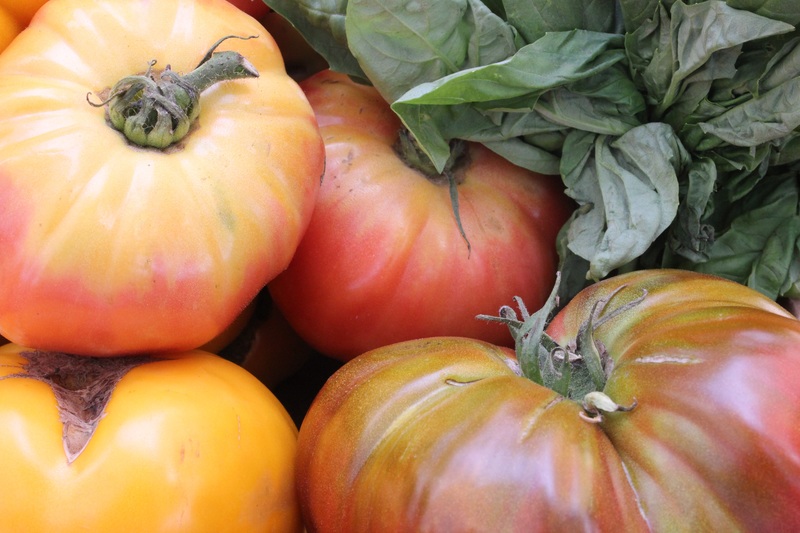Why heirloom produce beats hybrid varieties nutritionally, how you can easily test this at home for yourself, and where to find these vegetables locally.

Heirloom vs hybrid produce? Hopefully, you understand how to recognize the difference because it makes a big difference to the nutrition you’re getting!
Yesterday at our buying club pickup, a local farmer dropped by to display and sell his beautiful selection of organic produce.
Not just any old organic produce, however.
Organic heirloom produce.
Most folks don’t realize that the organic produce at WalMart, Whole Foods, or even the local health food store is almost exclusively hybrid vegetables. Once in awhile you will see some heirloom veggies at the health food store, but this is the exception rather than the rule.
Now, I have nothing against organic produce from hybrid seeds. Hybrid is not to be confused with GMO, by the way.
If you’re going to pay the premium for organic, however, you might as well go for the best tasting produce. This will almost always be the heirloom varieties and not the modern hybrids at the store.
George DeVault, executive director of Seed Savers Exchange, the leading nonprofit organization dedicated to saving and sharing heirloom and other rare seeds says:
A lot of the breeding programs for modern hybrids have sacrificed taste and nutrition. The standard Florida tomato is a good example. Instead of old-time juicy tangy tomatoes, it tastes like cardboard. It was bred to be picked green and gas-ripened because that’s what was needed for commercial growing and shipping.
Turns out that better taste means more nutritious too. We as consumers are paying a big price for the push by commercial growers for the higher yields and easier shipping (uniform size and ripening) provided by hybrid strains, particularly for organic produce.
I can tell you that organic produce from the store doesn’t taste nearly as good as it did 20 years ago which tells me that nutrition is poor. If you’ve ever used a refractometer to test the nutrient density of produce, you know that better taste means higher nutrition, a contest which heirloom veggies easily win compared with hybrids.
In this video below, I demonstrate the difference between a typical organic store tomato and two heirloom varieties from a local organic farmer.
Seeing is believing! Find a local produce farmer that grows heirloom varieties in rich soil and start enjoying the superior taste and nutrition for yourself. Supporting the production of heirloom varieties in your local community also fosters independence for our farmers as heirloom vegetables are open-pollinated which means the seed can be saved from year to year – saving the farmers an unnecessary expenditure each growing season.
Sources
Industrial Farming is Giving Us Less Nutritious Food
Heirloom Vegetables: Six Advantages Compared with Hybrids
How are Hybrid and Open Pollinated Vegetables Different?
More Information
4 Steps to Keep Monsanto OUT of Your Garden
The Hydroponic Invasion of USDA Organic
Our New Organic Garden Box and Rain Barrel Irrigation System
Why I Avoid Organic Hydroponics








How do you find these farmers? I live in the Trinity Fl. area and there aren’t any farms around here. I would be willing to travel to them however.
Great video! Once you’ve tasted a locally grown good organic heirloom tomato, you’ll never go back to the hybrid. Heirlooms have been bred for taste, resistance to disease and quantity output. Hybrids (organic or not) have been bred for beauty, shelf-life and transportability. The result is mush.
I’ve been growing brandywine heirlooms in my garden for years – saving seed each year. In this way, my tomatoes are now adapted to my soil and climate conditions. Ugly- maybe for some. It’s fun to watch my guests’ eyes pop out when they taste one. Beauty is in the eye of the beholder.
Sarah ~ What is your opinion about purchasing heirloom seeds from a brochure? I currently have tomatoes I’m growing started from seeds advertised as heirloom.
Sarah ~ What do you think about growing vegetables from brochure purchased heirloom seeds? I currently have tomato plants I am growing in my veggie garden.
knowledge is crucial these days especially when it comes to what produce and foods we are consuming…why pay $$$ for organic hybrid produce when you can get heirloom from your local farmers…
I think most people DO know that the organic produce is quite often a hybrid. It is exceptional to find organic produce that is also an heirloom or non-hybrid.
I completely agree! Heirloom food tastes so much better! It is too bad it is more expensive. I have noticed it is really hard to find a good tasting tomato nowadays.
They also cost a lot more! Our food budget is already astronomical.
You’re right, they’re more expensive. But, you can buy an heirloom tomato plant for the cost of 1-2 tomatoes with the productivity of giving you 30lbs of tomatoes. (A packet of seeds is even far less cost.) If you don’t have room for a garden, one tomato plant can easily be planted in a large pot.
Do you have suggestions on an organic fertilizer for my veggies?? Theyre doing okay but I’d love to up the output. 🙂
Composted manure is as good as anything. Pay attention as you drive around your neighborhood, where you see horses you will find horse manure. This manure can often times be had for the asking. If you like to fish composted fish is also good.
Sarah, I could not agree more. The heirloom varieties taste so much better!
Breeding plants for shelf life and appearance instead of taste and nutrition is one of the worst mistakes our culture ever made.